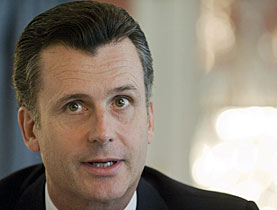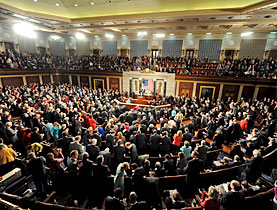Goliath banks should be “cut down to size”

Regulators should restrict the size of banks to make sure they do not become "too big to fail", according to the president-elect of Switzerland's central bank.
Philipp Hildebrand said the country’s two big banks, UBS and Credit Suisse, still faced a perilous situation despite measures being taken to reduce their risks.
Speaking at the half-yearly conference of the Swiss National Bank (SNB) in Bern on Thursday, vice-president Hildebrand called for new international regulations to deal with large failed financial institutions by splitting off units vital to national economies before winding down the rest.
Among Swiss monetary policymakers, Hildebrand has been the most forceful advocate for reducing the size of the banks, arguing that they would incur a devastating effect on the economy should they fail. UBS, Switzerland’s largest bank, had to be bailed out after racking up huge losses.
But to prevent bank collapses on the scale of Lehman Brothers in the United States last year, Hildebrand also suggested methods of making sure banks did not grow too big. Switzerland has already imposed stringent new rules that require banks to put aside even more reserves to cover risks and debt.
Size not everything
“Naturally the SNB is aware that there are advantages to size,” he said. “Nevertheless, in the case of the large international banks, the empirical evidence would seem to suggest that these institutions have long exceeded the size needed to make full use of these advantages.”
“There can be no more taboos, given our experiences of the last two years,” he added.
A failure of UBS or Credit Suisse would have more far-reaching consequences on Switzerland than Lehman Brothers did in the US, as the assets of each of the two banks far exceeds the gross domestic product of the entire country.
The SNB backed this up by producing its annual “Banks in Switzerland” report on the same day. It revealed a massive increase in losses from SFr4.3 billion ($4 billion) in 2007 to a record SFr38.9 billion last year. This dented overall profits for the country’s 327 banking institutions from SFr14 billion in 2007 to SFr8.4 billion in 2008.
UBS contributed the lion’s share of the losses (SFr36.5 billion) but this figure also included liabilities taken on by the parent company from its foreign subsidiaries. The bank reported a SFr20 billion loss in its consolidated annual statement, which stripped much of this out.
Bank break-up?
Swiss banking expert Professor Hans Geiger said failing banks could not become a pattern.
“Their size has to be limited to avoid what happened this time from happening a second time,” he told swissinfo.ch. “I think they [UBS and Credit Suisse] should be split up and the riskier operations should be sold off.”
“The right size of a bank depends on the risk attached. Wealth management could reach any size because it does not involve balance sheet risks for Switzerland. But investment bank trading of speculative assets should be done by hedge funds, not banks.”
UBS had no comment to make on Hildebrand’s statements but Switzerland’s financial regulator, Finma, hinted that it was thinking along the same lines as the SNB.
“One of the big lessons of the financial crisis is that this issue has to be addressed,” Finma spokesman Alain Bichsel told swissinfo.ch.
Matthew Allen, swissinfo.ch
The SNB’s Swiss “Banks in Switzerland 2008” report looked at the end of year financial condition of the 327 banking institutions in the country.
Losses rose from SFr4.3 billion in 2007 to SFr38.9 billion while profits nosedived from Sfr14 billion to SFr8.4 billion in the same period.
Most (284) banks reported a profit in 2008 with 90 of them posting even better figures. Redundancies had yet to affect the figures with only a nominal 0.3% decrease in staff numbers to 135,775 employed in Switzerland.
Customers flocked to move their money into savings deposits (an increase of 23% in funds) while moving out of securities. Clients invested 38.4% less of their savings in shares than they did in 2007.
In Switzerland’s universal banking system, all banks can offer all services. In English-speaking countries and Japan, commercial banking and investment banking must be separate.
Two “big” banks: UBS and the Credit Suisse Group account for more than 50% of the balance sheet total of all banks
Cantonal banks: semi-governmental organisations with a state guarantee
Regional banks and savings banks: smaller universal banks with an emphasis on lending/deposit business, which voluntarily restrict their activities to one region
Raiffeisen: a cooperative with the largest branch network in Switzerland, the Raiffeisen banks form Raiffeisen Switzerland
Private banks: individually owned firms, collective and limited partnerships and among the oldest in Switzerland
Foreign banks: over half of the company’s votes are held by foreigners with qualified interests, most are from the EU (more than 50%) and Japan (around 20%)
Source: Swiss Bankers Association

In compliance with the JTI standards
More: SWI swissinfo.ch certified by the Journalism Trust Initiative




You can find an overview of ongoing debates with our journalists here. Please join us!
If you want to start a conversation about a topic raised in this article or want to report factual errors, email us at english@swissinfo.ch.